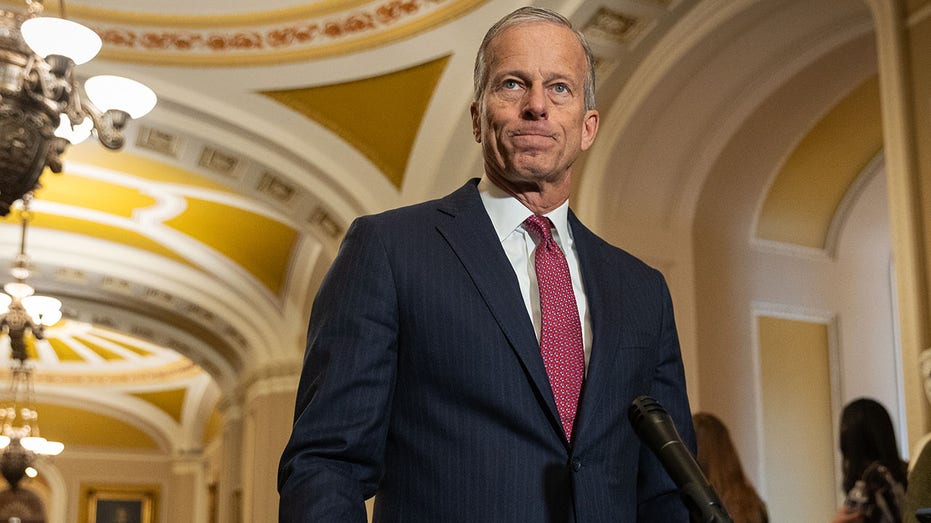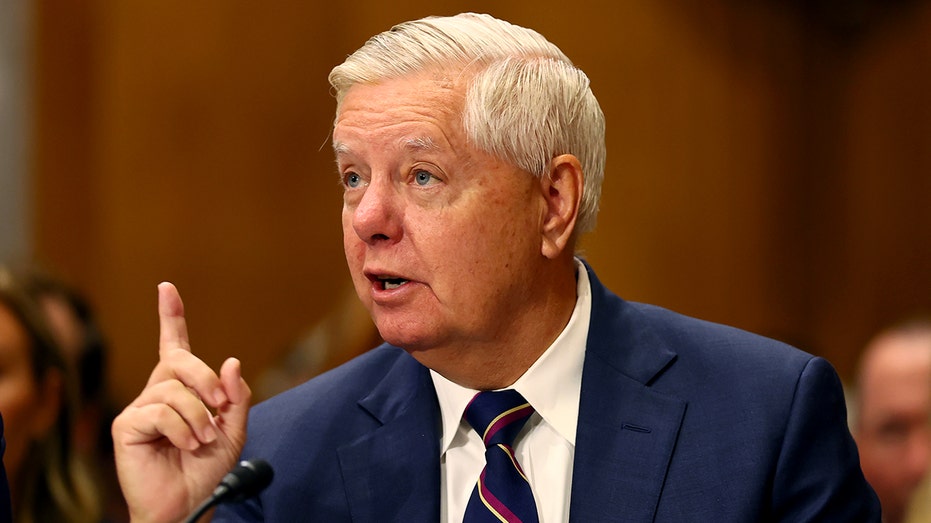Saudis won’t let the US use its bases or airspace for an attack on Iran, senior Gulf official reveals

As President Donald Trump weighs his options on a possible military strike on Iran, a senior Gulf official told Fox News Saudi Arabia will not allow the U.S. to use its airspace or bases for such an attack. A high-ranking government figure from a Gulf Cooperation Council (GCC) state told Fox News that the “U.S. hasn’t shared objectives or plans” regarding Iran with Gulf allies despite recent high-level Saudi meetings in Washington aimed at gaining clarity. “We said this as friends, [we] want to make sure they understand our position and our assessment in general. And we want to understand the U.S. assessment with as much clarity as possible,” the senior official said. “I’d like to get full clarity, and we did not get there.” Regarding U.S. military movements for a strike on Iran, the official said, “The plan is something other than using Saudi airspace.” TRUMP SAYS IRAN ALREADY HAS US TERMS AS MILITARY STRIKE CLOCK TICKS The official said the U.S. is welcome in Saudi Arabia, especially regarding Operation Inherent Resolve, the ongoing U.S.-led campaign against ISIS. Yet, the Saudi position now is “consistent” with what it was during the 12-day conflict between Israel and Iran in April 2024, the official said. “Saudi Arabia wouldn’t allow airspace to be used to target Israel, Houthis, Iran. The position is the same now. Saudi Arabia wouldn’t allow airspace to be used in a war Saudi Arabia is not a part of,” the official said. Trump said Friday that the United States has directly communicated expectations to Iran as pressure mounts for Tehran to accept a nuclear deal, even as Iranian officials publicly signal interest in talks. Asked whether Iran faces a deadline to make a deal, Trump suggested the timeline had been conveyed privately. “Only they know for sure,” he said when pressed that the message had been delivered directly to Iranian leaders. Trump also tied the growing U.S. naval presence in the region explicitly to Iran, saying American warships “have to float someplace” and “might as well float near Iran” as Washington weighs its next steps. AS IRAN WEAKENS, QUESTIONS GROW OVER MOHAMMED BIN SALMAN’S REGIONAL AMBITIONS Despite the president’s words that Iran wants to make a deal, the official cautioned that “Iran always wants to make a deal, but the question is what kind of deal? Is it acceptable to the U.S.? “We don’t see it coming together at this moment,” the official said. “Everybody knows the U.S. is bringing capabilities to the region in general to deal not with whatever the plan is but whatever the ramification of the plan is.” Regarding the success of future U.S. actions in Iran, the official said, “There is always a problem whether you make a decision or don’t. There’s a balance of … future in the Middle East. We advise the U.S. on a better outcome at the end, using all means, including diplomatic means, and advise Iranians too. … We understand that we’re all in this — the U.S., Iran and others — and we hope for better results.” The official said that, in the Gulf allies’ assessment, the Trump administration’s strikes on Iran’s nuclear assets heavily degraded their capabilities so that they are “not in the same situation as before.” TRUMP SAYS IRAN CALLED ‘NUMEROUS’ TIMES TO MAKE DEAL AS CARRIER ENTERS MIDDLE EAST WATERS That being said, they believe an “off ramp could be reached by Iranians doing the right thing.” “We want a prosperous country that supports their people. That’s what we think we should all be doing. Iran has real economic potential, energy. A lot of talent in Iran and especially abroad who live in other countries. … There’s a way to get out of it, and Iran could be a very constructive actor in the region and important actor in the region. I hope that they get there because the Iranian people deserve a lot.” Though the U.S. has not shared its objectives or plans, the source said, “I hope that outcome is for a more stable Middle East, more prosperous.”
DHS fires back after Dem accuses ICE of ‘needlessly’ detaining boy with father after mom refused to take him

Democratic Sen. Tammy Duckworth of Illinois is accusing U.S. Immigration and Customs Enforcement of “needlessly” detaining a 5-year-old child with his illegal immigrant father after the agency said his mother refused to take custody. In an X post featuring pictures of 5-year-old Liam Ramos, Duckworth, a second-term senator, wrote that “Trump’s ICE snatched this bright, happy 5-year-old from his driveway.” “They shipped him 1,300 miles to suffer, without his mother, in a squalid Texas detention center. And now he’s growing ill. Democrats are fighting to end this cruelty,” she wrote. “Liam is not a criminal. Let him go.” DEM GOVERNOR DUCKS QUESTION ON ‘MONSTER’ ILLEGAL ALIEN WHO FRACTURED 8-YEAR-OLD’S SKULL WITH ROCK ATTACK However, Department of Homeland Security Assistant Secretary Tricia McLaughlin posted a statement from Dr. Sean Conley, acting director of DHS’ Office of Health Security and chief medical officer, in which he addressed the child’s condition. Conley said that a pediatrician examined Ramos and “found no medical concerns.” “It is standard policy to provide medical care from the moment an alien enters ICE custody. This includes medical, dental and mental health intake screening within 12 hours of arriving at each detention facility, a full health assessment within 14 days of entering ICE custody or arrival at a facility and access to necessary medical appointments and 24-hour emergency care. This is the best healthcare many of these individuals have received in their entire lives,” said Conley. The doctor added that “ensuring the safety, security and well-being of individuals in our custody is a top priority at ICE.” He said illegal aliens are “provided with three meals a day that are certified by dieticians, including pediatric considerations.” In response, Duckworth told Fox News Digital, “The Trump administration suggesting that needlessly keeping a 5-year-old in federal custody is in his best interests is appalling. “Detaining children like this is cruel, no matter what Trump’s DHS says,” said Duckworth. “The best thing they can do for Liam is return him to his mother.” WATCH: HARDCORE SOCIALIST GROUPS STAGE-MANAGE ANTI-ICE PROTEST IN WASHINGTON Ramos was taken into custody along with his illegal immigrant father, Adrian Alexander Conejo Arias, by federal immigration authorities Jan. 20 in a suburb of Minneapolis. They are both being held at the Dilley Immigration Processing Center in South Texas. Federal authorities were trying to take Conejo into custody in Minneapolis last week when he fled and left Ramos, who was arriving home from preschool, the Department of Homeland Security said. Some ICE officers remained with the boy while others chased down Conejo, who was apprehended soon after. ICE officers made multiple attempts to have Ramo’s mother, who was inside her home, take custody of her son, but she refused, DHS said. MINNESOTA AG KEITH ELLISON DENIES ICE DEAL AMIDST IMMIGRATION CRACKDOWN DEBATE McLaughlin said “officers even assured her she would not be taken her into custody,” but “the alleged mother refused to accept custody of the child. The father told officers he wanted the child to remain with him.” “Following the mother’s abandonment of the child, officers abided by the father’s wishes to keep the child with him. Father and son are together at Dilley [Immigration Processing Center],” DHS said in an X post. Conejo entered the U.S. illegally in December 2024 and was released into the U.S. by the Biden administration, DHS said. The family’s attorney said he had a pending asylum claim allowing him to stay in the country. A federal judge on Tuesday temporarily blocked the Trump administration from deporting Arias and his child.
Rep Jeffries escalates rhetoric against Noem, says DHS leader should be ‘put on ice permanently’

House Minority Leader Hakeem Jeffries, D-N.Y., said Thursday that Department of Homeland Security (DHS) Secretary Kristi Noem should be “put on ice permanently” as he threatened impeachment proceedings against the Cabinet official during a news conference. Jeffries made the remarks while responding to questions about whether Democrats would move forward with impeachment if Noem is not fired and whether he has spoken with Republicans about supporting such an effort. A Trump administration source sharply condemned Jeffries’ language, warning that it would have sparked outrage had it come from a Republican leader. GOP LAWMAKER RENEWS OVERSIGHT HEARING REQUEST OF DHS AGENCIES FOLLOWING FATAL SHOOTING IN MINNEAPOLIS “Imagine if the Republican majority leader had made similar remarks about Joe Biden while he was president?” the source told Fox News Digital. “The liberal media would be up in arms to charge him with inciting an assassination. “Now we hear crickets from the very same people who greedily glean through every word from conservative officials.” The source added that Jeffries’ comments were especially dangerous given the current political climate. “What Jeffries said is dangerous and unfathomably stupid given the culture of political violence the left has endorsed and perpetrated against conservative leaders. He should know better. He does know better,” the source said. During the news conference, Jeffries said he had reiterated his impeachment threat in a recent conversation with House Speaker Mike Johnson, R-La. KRISTI NOEM FACES IMPEACHMENT EFFORT IN HOUSE AS 70 DEMS PUSH OBSTRUCTION OF CONGRESS CHARGE “I did reiterate in my conversation with Speaker Johnson that we intend to proceed with impeachment proceedings if Kristi Noem is not fired,” Jeffries said. “Kristi Noem is a complete and total embarrassment. She’s a disgrace.” Jeffries went on to accuse Noem of having “presided over” deaths he linked to immigration enforcement actions. “And on top of all of that, she’s presided over the cold-blooded killings of American citizens like Renee Nicole Good and Alex Pretti,” Jeffries said. “Unacceptable.” WHITE HOUSE BLASTS TOP HOUSE DEMOCRAT AS A ‘BUFFOON’ AFTER JEFFRIES BRANDS STEPHEN MILLER A ‘HATEFUL BIGOT’ Jeffries also criticized Senate Republicans who voted to confirm Noem, calling her “wildly unqualified” for the role. “She should have never been confirmed,” he said. “Shame on every Republican in the Senate who put this wildly unqualified person into a position of significance — the Department of Homeland Security — so she could unleash brutalization on everyday Americans, American citizens and law-abiding immigrant families. Just disgraceful.” Jeffries concluded his remarks by repeating his demand for Noem’s removal, using language that immediately drew attention. “She’s got to go. We are dead serious,” Jeffries said. “She needs to be put on ice permanently. She’s got to go.” In a statement shared by Fox News’ Aishah Hasnie late Friday, Jeffries appeared to backtrack on his rhetoric, saying, “She needs to be put on ice. It’s clear, right? That means gone. G-O-N-E. From her position. Don’t misinterpret anything that I’ve said.” Asked when he last spoke with Johnson, Jeffries replied, “Yesterday.” Fox News Digital has reached out to Jeffries’ office for comment.
‘Opening Pandora’s Box’: Mike Johnson backs Trump after warning White House about deal with Democrats

Speaker Mike Johnson, R-La., urged House Republicans on a lawmaker-only call to rally behind President Donald Trump after the commander in chief struck a deal with Senate Democrats to avert a prolonged government shutdown, Fox News Digital was told Friday evening. The top House Republican admitted to being “frustrated” by the result, sources told Fox News Digital, but he lauded Trump’s deal-making ability and called for lawmakers to back the president’s decision. The Senate passed a revamped government funding deal Friday that will set the federal budget through the end of the fiscal year Sept. 30, save for the Department of Homeland Security (DHS). It comes after Democrats walked away from a bipartisan plan to fully fund the federal government over demands for stricter guardrails on Immigrations and Customs Enforcement (ICE) than what the initial House-passed package included. THE HITCHHIKER’S GUIDE TO WHY THERE MAY BE A PARTIAL GOVERNMENT SHUTDOWN SATURDAY Johnson told House Republicans he went to the White House Wednesday to lay out his arguments for sticking to the initial plan and warned, “Opening the Pandora’s Box of amending this thing could be a dangerous prospect,” sources said. Trump nevertheless struck an agreement with Senate Democrats. Fox News Digital was told that Johnson conceded, “The president has made a play call, and we have to support him on it.” The initial bipartisan DHS bill included guardrails for ICE, such as mandating body-worn cameras and training for public engagement and de-escalation. But Democrats are now demanding significantly more after a second deadly shooting of a U.S. citizen by federal law enforcement during demonstrations against Trump’s immigration crackdown in Minneapolis. SENATE GOP HOLDOUTS REFUSE TO BUDGE AS SHUTDOWN TALKS CONTINUE The new deal struck with Democrats would only extend current DHS funding levels for two weeks to keep other critical agencies under the department’s purview funded while new bipartisan negotiations on immigration enforcement play out. Multiple Republican lawmakers have both publicly and privately expressed concern about the deal, arguing it could potentially give Democrats more ability to constrain the administration. One House Republican voiced such concerns on the lawmaker-only call on Friday, Fox News Digital was told. Johnson, according to sources, agreed he was “frustrated … but I’ve got to tip my hat to the president. He knows the art of the deal.” SENATE REPUBLICANS WEIGH DEM DEMAND TO SPLIT DHS BILL, TURN TO SHORT-TERM EXTENSION TO AVOID SHUTDOWN Johnson told House Republicans that Trump now needed their support to “navigate the next two weeks” of deal-making with Democrats. Trump said on Truth Social of his deal with Democrats, “I am working hard with Congress to ensure that we are able to fully fund the Government, without delay. Republicans and Democrats in Congress have come together to get the vast majority of the Government funded until September, while at the same time providing an extension to the Department of Homeland Security (including the very important Coast Guard, which we are expanding and rebuilding like never before).” Sources said the speaker did sound optimistic about Republicans still having leverage in the talks, however. Johnson noted that ICE had already been funded under Trump’s “big, beautiful bill” and that it would be offices like the Transportation Security Administration (TSA) and Federal Emergency Management Agency (FEMA) that would run low on funds. Sources said Johnson said of Democrats, “We can hang that on their necks.” The House is expected to take up the legislation by Monday evening.
WATCH: Hardcore socialist groups stage-manage anti-ICE protest in Washington

A network of self-described socialist and communist organizations staged carefully coordinated protests across the country Friday targeting U.S. Immigration and Customs Enforcement, but their call for a nationwide shutdown of work, school and commerce mostly fizzled out. Several of the groups behind the demonstrations are linked to a constellation of nonprofits funded by tech tycoon Neville Roy Singham, according to an ongoing Fox News Digital investigation. Singham, who lives in China and has publicly espoused Marxist ideology, has used his extensive network to promote pro–Chinese Communist Party messaging. Fox News Digital was on hand in Washington, D.C., as activists converged near the Gallery Place–Chinatown Metro station at 7th and H Street NW. At 2:49 p.m. A vehicle drove up to an alley near a Walgreens, where a small group of activists from the local chapter of the Party for Socialism and Liberation unloaded dozens of bright yellow protest signs stapled to wooden pickets. The Party for Socialism and Liberation is a self-described Marxist organization that has played a central role in past anti-police and anti-ICE demonstrations. DOZENS ARRESTED AFTER PROTESTERS TAKE OVER NYC HOTEL LOBBY DURING ANTI-ICE DEMONSTRATION The foot soldiers handed out the signs near the Chinatown Metro station, next to a Planet Fitness. At 3 p.m. sharp – the scheduled start time – one of the Party for Socialism and Liberation’s leaders carried a pile of signs to the corner and yelled instructions. “Into the streets,” she shouted. MINNESOTA RESTAURANTS BY THE DOZENS PLANNING TO SHUT DOWN FRIDAY TO PROTEST ICE ENFORCEMENT The protesters, with new signs in their hands, followed quietly behind. The broader protest action was promoted as part of a “National Shutdown” scheduled for Friday, urging “no work, no school, no shopping” in opposition to ICE operations nationwide. Promotional materials accused federal immigration authorities of “terror” and demanded an end to ICE funding. “STOP ICE TERROR NOW,” one sign read in bold black letters, with the “PARTY FOR SOCIALISM AND LIBERATION” in smaller letters below. MINNESOTA SOCIALISTS TELL WORKERS TO FAKE SICK LEAVE FOR ANTI-ICE PROTESTS Along with the Party for Socialism and Liberation, several of the organizations behind the protests were the People’s Forum, CodePink and BreakThrough News – all groups that are part of the communist ecosystem funded by Singham. CodePink co-founder Jodie Evans is married to Singham. Other explicitly socialist and communist groups listed as endorsers or organizers included the Revolutionary Communists of America, Communist Party USA and its regional branches, Socialists Without Borders, Socialist Equality Party, Freedom Road Socialist Organization, Socialist Alternative, Democratic Socialists of America chapters, Marxist student organizations, like the George Washington University Socialist Action Initiative, and revolutionary groups aligned with anti-capitalist causes. Propaganda experts say these types of protests are meant to create a media narrative of a failed state, one of the key tactics of insurgencies, and a convenient narrative for U.S. rivals, such as China. TWIN CITIES MUSEUMS SLAM THEIR DOORS FRIDAY AS THEY TAKE SIDES IN ‘ICE-OUT’ STRIKE In addition to far-left groups, the protest coalition also included organizations aligned with the Democratic Party. Notably, multiple chapters of Indivisible, a national activist network that frequently donates to Democratic political campaigns, endorsed the protest. Other left-leaning civic and advocacy groups, including unions, with ties to Democratic politics also signed on, blurring the line between grassroots protest and partisan activism. Throughout the event, demonstrators took selfies, mugged for cameras and filtered away not long after, as the police returned the regular day back to the streets. “Where do you want to go for drinks?” one protester was heard asking another. Fox News Digital’s Kiera McDonald and Hannah Brennan contributed to this article.
Senate passes federal funding compromise; Democrats score victory in DHS revolt

Senate Republicans and Democrats cut through partisan rancor and sent a retooled government spending package to the House Friday evening after President Donald Trump struck a deal to sate Democrats’ demands. Though lawmakers were able to advance the revamped five-bill package without the controversial Department of Homeland Security (DHS) funding bill and a two-week funding extension to keep the agency afloat, a partial government shutdown is all but guaranteed after the 71-29 vote. That’s because modifications to the package and the inclusion of a short-term continuing resolution (CR) for DHS must be approved by the House. And lawmakers in the lower chamber aren’t scheduled to return to Washington, D.C., until early next week. GRAHAM THREATENS SHUTDOWN DEAL OVER HOUSE-BACKED REPEAL, WARNS JOHNSON: ‘I WON’T FORGET THIS’ Schumer and his caucus are determined to get a series of extra reforms attached and dropped three categories of restrictions on Immigration and Customs Enforcement (ICE) on Wednesday that many Republicans have balked at. “These are not radical demands,” Schumer said on the Senate floor. “They’re basic standards the American people already expect from law enforcement. I hope we can get voting quickly here in the Senate today so we can move forward on the important work of reining in ICE. The clock is ticking.” Democrats argued that the tweaks were common sense and geared toward reducing further incidents during immigration operations around the country after two fatal shootings by federal agents in Minneapolis this month. “This is not like some wish list,” Sen. Tina Smith, D-Minn., said. “This is, like, really practical, commonsense stuff that would actually go a long way towards minimizing the harm that we’re seeing in Minnesota.” Among the most difficult requests is the requirement of judicial warrants, rather than administrative warrants, for ICE agents to make arrests. Sen. Eric Schmitt, R-Mo., argued that while Republicans didn’t want to have a government shutdown, they wouldn’t legislate “stupid s—” into the DHS bill. 7 REPUBLICANS JOIN DEMS TO BLOCK MAJOR GOVERNMENT FUNDING PACKAGE AS SHUTDOWN LOOMS “We’re not, like, telling [ICE] they need judicial warrants when they already have administrative warrants,” Schmitt said. “We’re not doing that.” Successfully moving the bill from one chamber to the other was not an easy lift for Republicans. A cohort of Senate Republicans pushed back against the underlying, original package because of the billions in earmarked funding it included. And Sen. Lindsey Graham, R-S.C., was enraged over the House’s decision to include a repeal of a provision that would allow senators, like himself, to sue for up to $500,000 if they had their phone records subpoenaed by former special counsel Jack Smith as part of his Arctic Frost probe. “You jammed me, Speaker Johnson. I won’t forget this,” Graham said. “I got a lot of good friends in the House. If you think I’m going to give up on this, you really don’t know me.” He demanded votes on expanding the number of people and organizations who were affected by Smith’s Arctic Frost probe who can sue, along with a vote on his legislation that would criminalize the conduct of officials who operate sanctuary cities. HOUSE GEARS UP TO TAKE SENATE’S GOVERNMENT SHUTDOWN DEAL WITH RARE SUNDAY MEETING But he didn’t tee them up for an amendment vote, instead contending he’d be OK with floor action after the two-week CR lapsed. Moving the package through the House could be a heavier lift than expected. House Speaker Mike Johnson, R-La., expected the earliest he could move on the package was by Monday, three days into the partial shutdown, given that lawmakers are away from Washington, D.C., until next week. One House GOP source suggested to Fox News Digital that passing the legislation under suspension of the rules could be a pathway to success because it would fast-track the bills past a House-wide procedural hurdle called a “rule vote” that normally falls along party lines. But that would require raising the threshold for passage from a simple majority to two-thirds, meaning a significant number of Democrats would be needed for the bills to proceed. That does not appear to be the route House leaders are taking, however, at least for now. Two other sources told Fox News Digital Friday morning that the House Rules Committee is expected to meet for a rare Sunday hearing to consider the bill. The House Rules Committee is the final gatekeeper before most legislation gets a chamber-wide vote, meaning its advancement of the package Sunday could set up further action as early as Monday. House Republican resistance to the modified package, particularly the DHS CR, has already fomented among members of the House Freedom Caucus. House Freedom Caucus Chair Andy Harris told Fox News Digital “the Democrats’ desire to keep millions of illegal aliens in the United States will not suddenly disappear in a week or a month with a continuing resolution.” “Delaying full year funding for the Department of Homeland Security any further is a bad idea,” Harris said.
Watchdog claims proof of ‘harm’ nonexistent in suit against Trump’s ban on trans surgeries for minors

FIRST ON FOX: A Trump-aligned lawfare group filed records requests attempting to uncover the “harm” that Democrat-led states said was being incurred as a result of President Trump’s executive order banning sex changes for minors. However, those states either ignored their requests or said they could not find any responsive records documenting the harms their lawsuit warns are already happening . After 15 states, the District of Columbia and Pennsylvania Democrat Gov. Josh Shapiro sued the president and his Department of Justice over the executive order Aug. 1, America First Legal filed records requests to those states suing in an attempt to uncover whether the claims of injury are true and accurate. TRUMP ADMIN FINDS CALIFORNIA BAN ON NOTIFYING PARENTS OF GENDER TRANSITIONS VIOLATED FEDERAL LAW Only three states — Massachusetts, Illinois and Nevada — have provided any sort of response thus far. Furthermore, the responses that did arrive indicated there were no responsive records relating to AFL’s request even though they asked for documents pertaining to precisely what the lawsuit in question alleges. “States suing the Trump administration appear to lack evidence of actual harm supporting their allegations,” said Dan Epstein, vice president of America First Legal. “The Trump administration’s executive order sought to protect minors from permanent physical damage. Protecting children should not be subject to politics.” A nationwide preliminary injunction was issued just a few months after the issuance of Trump’s executive order prohibiting physicians from performing sex change surgeries on individuals under the age of 19. And, according to Epstein, the plaintiffs still must show “standing” for a court to provide a remedy, and just because the plaintiffs filed their suit early does not mean this responsibility disappears. “Because standing is necessary for any federal court to provide a remedy, plaintiffs must plead concrete evidence of harm in their complaint,” Epstein asserted. “Here, plaintiffs’ complaint failed to show an actual, traceable loss tied to the federal action, beyond merely speculative claims of harm or generalized concerns. Filing suit early does not eliminate this requirement to establish standing.” Fox News Digital reached out to the health departments and attorneys general offices in Massachusetts, Illinois and Nevada, to request information about the documents being relied upon by plaintiffs in their suit against Trump’s executive order. In particular, Fox News Digital also asked if the state health departments had no responsive records or whether there might be anywhere else they could be kept. Again, it did not receive a response. In the lawsuit challenging Trump’s Executive Order 14187, which bans federal taxpayer dollars from being used to “fund, sponsor, promote, assist, or support the so-called ‘transition’ of a child from one sex to another,” the blue state plaintiffs allege the executive order was fostering “an atmosphere of fear and intimidation experienced by transgender individuals, their families and caregivers, and the medical professionals who seek only to provide necessary, lawful care to their patients.” PRIVACY CONCERNS, DISCRIMINATION, DOCTOR PUSHBACK: THE COMPLIANCE TRAPS LOOMING BEHIND SEX-SEPARATED SPORTS AFL’s records requests sought any documents showing the states had actually experienced the harms they claim in their lawsuit against Trump’s Executive Order 14187, including evidence of prosecutions or penalties for providers, clinic closures, reduced services and increased medical or mental-health crises for transgender adolescents. The group also asked for records showing higher costs for services like counseling, crisis intervention or hospitalizations, worsened mental and physical health outcomes or the states’ inability to meet legal obligations to provide medical care for minors in state custody. AFL also asked for any internal communications specifically referencing the executive order and its alleged effects. Massachusetts and Nevada said they had zero records pertaining to any of their requests, while Illinois responded that it had no records responsive to every one of AFL’s requests except for the last and most broad one that asked for records and communication mentioning the terms “Executive Order 14187,” the order’s formal title or “affect shape harm.” The records handed over by Illinois’ public health department included notices that agency personnel received notifying them that funds could not be used for services that violate President Trump’s Executive Order 14187 and notices to grantees telling them they may incur new costs that support programs or activities in conflict with the executive order. Illinois’ records also showed that a program director at a nonprofit healthcare group expressed concern about an inability to register new clients because the president’s directive prevented staff from asking a patient’s gender identity or preferred pronouns, which were required fields in the healthcare group’s client database. Because clients have to be enrolled in the database to receive HIV/AIDS services, the director feared this could affect those services. Illinois records showed a slowdown in grant releases as well, while everyone got up to date with the new requirements of Trump’s executive order. Fox News Digital reached out repeatedly to the public health departments and the offices of the attorneys general for comment on AFL’s accusations that their lawsuit is without evidence but only received a response from Massachusetts’ Department of Public health, which referred Fox News Digital to the state’s Attorney General office. “AFL has previously exposed other states’ lack of standing in their own respective cases against the Trump administration. Specifically, AFL uncovered Colorado, Rhode Island, Hawaii and Arizona’s lack of evidence supporting their claims of injury in an attempt to block the Trump Administration’s sharing of Medicaid beneficiary data with the U.S. Department of Homeland Security,” a press release from the lawfare group said. “These states’ responses to AFL’s records requests repeatedly reveal a lack of standing. AFL will continue to expose baseless litigation efforts aimed at undermining the America First agenda.” Trump’s Executive Order 14187 is also being challenged for alleged discrimination in a lawsuit against the Health and Human Services Department led by New York Attorney General Letitia James.
Federal judge strikes down parts of Trump executive order on citizenship verification for voter registration

A federal judge on Friday struck down key portions of President Donald Trump’s executive order aimed at tightening citizenship verification for voter registration and absentee ballot applications, ruling the White House overstepped its constitutional authority. U.S. District Judge Colleen Kollar-Kotelly said the Constitution gives states and Congress, not the president, the power to set rules for federal elections. Kollar-Kotelly blocked provisions in the executive order that would have required documentary proof of American citizenship on federal voter registration and absentee ballot forms. REPUBLICANS, DEMS BREAK THROUGH RESISTANCE, MOVE FORWARD WITH TRUMP-BACKED FUNDING PACKAGE “The Constitution does not allow the President to impose unilateral changes to federal election procedures,” Kollar-Kotelly wrote, permanently enjoining the administration from implementing the challenged provisions of the order. Trump signed the order, titled “Preserving and Protecting the Integrity of American Elections,” on March 25. CLICK HERE TO GET THE FOX NEWS APP The White House did not immediately respond to Fox News Digital’s request for comment. This is a developing story, check back later for updates.
EXCLUSIVE: Epstein emails released as DOJ says no criminal or inappropriate conduct by Trump

FIRST ON FOX: The Justice Department released more than 3 million Jeffrey Epstein records including his personal emails Friday, with Deputy Attorney General Todd Blanche telling Fox News Digital that “in none of these communications, even when doing his best to disparage President Trump, did Epstein suggest President Trump had done anything criminal or had any inappropriate contact with any of his victims.” “During the course of our investigation, we seized years and years’ worth of Epstein’s personal emails,” Blanche told Fox News Digital. “These are communications with hundreds and hundreds of individuals discussing intimate details of Epstein’s and others’ lives.” EPSTEIN FILES EXPLODE OPEN AS DOJ DETAILS DISCOVERY OF POWERFUL FIGURES AND MORE THAN 1,200 VICTIMS “In none of these communications, even when doing his best to disparage President Trump, did Epstein suggest President Trump had done anything criminal or had any inappropriate contact with any of his victims,” Blanche told Fox News Digital Friday morning. Fox News Digital first obtained newly declassified emails from the Epstein case Friday morning. The Justice Department is expected to release more than 3 million pages of records from the files Friday, Blanche said. The new records mentioning the president largely show Epstein showing his disdain for Trump and criticizing him during his first administration. But one email reviewed by Fox News Digital was from March 2016, between Epstein and author and reporter Michael Wolff. In the email, Wolff is encouraging Epstein to come up with an “immediate counter narrative” to James Patterson’s book about him, “Filthy Rich: A Powerful Billionaire, the Sex Scandal that Undid Him, and All the Justice that Money Can Buy.” “You do need an immediate counter narrative to the book,” Wolff writes. “I believe Trump offers an ideal opportunity. It’s a chance to make the story about something other than you, while, at the same time, letting you frame your own story.” “Also, becoming anti-Trump gives you a certain political cover which you decidedly don’t have now,” he continues. In another email, three years later, in January 2019, Epstein writes to Wolff: “Of course he knew about the girls as he asked Ghislaine to stop.” In another email, in February 2019, Epstein writes a long email to Wolff, noting that (REDACTED) worked at Mar-a-Lago, and that “Trump knew of it and came to my house many times during that period.” “He never got a massage,” Epstein writes. Epstein then goes on to discuss a business arrangement involving Trump relating to a friend who was having “financial difficulty with assisted living homes.” In another email to Wolff in January 2018, Epstein is complaining about the president, saying that he “doesn’t take advice,” and that “his children have little experience and poor judgment.” “There are huge discrepancies re his real net worth,” Epstein writes to Wolff. “Full disclosure would make it clear.” Epstein, also in January 2018, continues mocking Trump, calling him “dopey Donald or demented Donald,” and complains about his finances and acquisitions and relationship with Deutsche Bank. Meanwhile, in emails between Epstein and Thomas Landon of The New York Times in January 2018, Landon asks if Epstein still is in touch with Wolf, who had published his book “Fire and Fury” about Trump. “Yup,” Epstein replies. Landon writes: “Have to say, he is looking/sounding increasing unhinged—Are you tempted to take any money off the table in the markets?” “No. But no question Donalds statement is goofy,” Epstein replies. It is unclear which Trump statement he is referring to. “Early dementia?” Landon replies: “You be judge—wasn’t here a time when he at least completed sentences?” Epstein writes back: “No, he was always stupid.” This is a developing story. Please check back for updates.
Reporter’s Notebook: Senate funding deal hits snag as Graham presses sanctuary city vote

Expect a major floor speech by Sen. Lindsey Graham, R-S.C., around 11:30 a.m. ET Friday about why he’s holding up the revised government funding package. Graham tells Fox News he will lift his hold on the bill if he gets an agreement to have a vote on his bill to criminalize the conduct of local officials who operate sanctuary cities. Graham and other Republican senators believe they have the home field advantage when they talk about the causes that led to the border crisis and illegal immigration. He and other GOPers believe the two-week funding window for DHS gives Republicans the opportunity to reclaim the issue. HOUSE CONSERVATIVES SKEPTICAL AS SENATE DEAL SACRIFICING DHS SPENDING REACHED: ‘NON-STARTER’ Secondly, Graham wants a vote to expand the pool of up to 190 groups or individuals who were surveilled by former Special Counsel Jack Smith to give them the right to sue Smith. TENSIONS BOIL IN HOUSE OVER EMERGING SENATE DEAL TO AVERT GOVERNMENT SHUTDOWN A provision giving certain Republican lawmakers whose phone records were targeted by Smith the right to sue for $500,000 was stripped from the minibus spending package by the House. So Graham wants to broaden the pool of those who can sue for damages. He also wants to restrict investigations from acquiring future telephonic metadata of House and Senate members, unless they are facing a criminal investigation themselves. This would bar future “fishing expeditions.”

